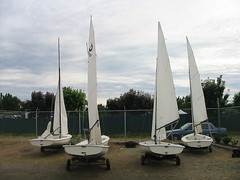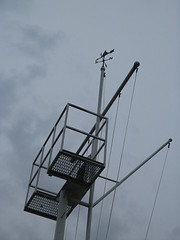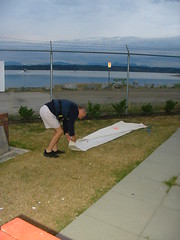
Pirates rigged for sail
Originally uploaded by Allan & Cheryl
On Tuesday night, the night I broke my glasses, we had a wild time of it. The skies were overcast, we had intermittent showers, and the wind was 'variable'.
I looked up at the weather mast as I came into the compound to see what direction the vane was indicating the wind was coming from. East by north-east. Twenty minutes later, we came back outside after a short classroom session and it was showing east.
That evening was our third class, our second time out in the boats, but our very first time with just ourselves. Instead of taking us out one at a time, we got into 4 pairs to crew our own boats, and our instructors spent the evening in a motor boat following us around.
The wind was kicking up a fair bit of chop, but Geoff and Mike didn't look concerned, so I figured it wasn't too scary. Still, I was keyed up and so was Tom, my partner. We rigged our boat and then waited our turn to walk it on the cart down to the shore. I took one last look at the vane. North-east.
I was a little nervous, so when Tom volunteered to take the tiller first, I didn't object. I pushed us off the shore and we headed out into the waves. He seemed to be doing okay with the tiller as we tried a few tacks back and forth. A few gusts came our way and Tom handled them just fine, by 'pinching' - which is to head up into the wind a little so that there isn't as much pressure on the sails.
By that time, Geoff and Mike had set up two buoys, 'markers' they called them, that we were going to to practice sailing back and forth between. They had set up the markers across the wind so that we could practice reaching out and back. They didn't enforce a specific course - like going clockwise only - so we could opt to tack at either end, and not worry about gybing.
It didn't exactly work out like Geoff and Mike had planned. In our very first turn around the first marker, Tom and I tried to come around into the wind and change tacks. There was a fair bit of confusion, we oversteered, and got caught by a gust of wind. That is an understated way of saying we lost our heads, had an accidental gybe, put the whole boat out of balance, and almost capsized. The key word there is 'almost'. Despite the wind, we righted ourselves in time, and saved Geoff and Mike the trouble of having to rescue us.
The only real negative to the whole episode was that our cockpit was left about 1/4 full of water and we didn't have a bailing bucket to lighten our ballast.
After that we were more deliberate about who was doing what when changing tacks, and we quickly got more confident with the whole procedure. We even worked on gybing properly too. We saw as the evening wore on that we weren't the only crew caught by an unexpected gust of wind when tacking or gybing. What was encouraging was that none of the other three crews in the class dumped that night either.
In between tacking and gybing, we had a lot of fun reaching across the wind. The wind was blowing hard enough that whomever was a the tiller had to 'hike out' more often than not. (Hiking out just means you're holding your body out over the side of the boat so that its weight can offset the pressure of the wind on the sails trying to push the boat over.) Whenever this happened, the boat would take off like a race horse and we hooted and hollered as we raced back and forth between the markers.
Tonight, when I arrived at the compound I could tell that everyone else was still feeling the consequences of Tuesday night's blustery sailing. Wednesday and today my thighs were really sore from holding my legs straight while hiking out. Like me, their faces winced every so often, whenever they had to bend or walk as they rigged their boats.

Leaden sky - barely a breath of wind stirred the vane tonight.
Originally uploaded by Allan & Cheryl
In a way, even though the air was disappointingly still, it would be just as well, since it did not look like anyone was up to the same kind of workout as on Tuesday night.
We did a short post-mortem of our Tuesday night class where Geoff mostly praised everyone for doing much better with their steering and sail handling. He was impressed that no one had dumped and everyone had got their boats moving on the course between the markers a lot more quickly than he had expected.
Tonight they set up the markers again - but parallel to the wind instead. With the course set up this way, the emphasis was on fine-tuning our tacking and gybing skills since no one could avoid gybing.
This evening's class turned out to be both easier and more difficult than anyone had anticipated. On the one hand, it was easier because we didn't have to worry about being caught by unexpected gusts or deal with having to hike out because of a lot of wind. On the other hand, it was harder because the direction of the wind was harder to gauge when it was so light. It was also harder because you had to factor in the current from the flooding tide.
When the breeze is hardly moving, 'light airs' it's called, everything moves in. slow. motion.
You adjust the helm to try and come as close onto breeze as you can, moving the tiller back and forth you can feel the boat respond ever so gently and you start to get a feel for how to hold the tiller extension and how you need to sit so it sits in your hand (like a microphone) comfortably.
You try and adjust your sails. You haul in the sheets and set them in the cleats. Half a minute later you cast them off again to see if you can get any better performance from your boat with your sails bellied out further.
All the while you look at the trees, flags, and pennants on shore, searching for a hint of the wind picking up or at least the direction it is moving in now. You look at the other crews in the class, in their boats, and wonder how they could be possibly passing you when they are sailing in the same airs you are. You look at your tiller and sails again and start adjusting them again.
Until the wind dies off completely and you sit there, unmoving, dead in the water. It is at those moments when you truly realize that you are at the mercy of the elements. You look at the glassy sea around you, at the empty sky above, and wait for a sign. Any sign. Any indication that the wind is coming back.
And then, like generations of sailors before, you start imagining signs. "Maybe that seagull lifting off the water means the wind is coming?" "Maybe everyone else is passing us because our boat is jinxed?" "Maybe my brain isn't working because I forgot to bring a water bottle again?"
And then, while all this foolishness is passing through your head, the jib gives an warning flap, and the wind comes back up again. And away you go.
"That," said instructor Geoff at the end of the night, "is what sailing is all about."
Next time I'll remember to whistle.

Rolling up sails after class - Part of the after class ritual is to take the sails off our boats, fold them up, and put them away.
Originally uploaded by Allan & Cheryl








No comments:
Post a Comment